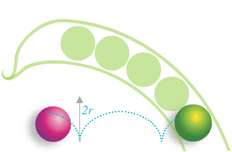
Opened to the public in April 2004, the new Marian Koshland Science Museum uses engaging, interactive exhibits to bring to life the numerous reports conducted by the prestigious National Academies every year. The museum program requires each exhibit be designed to travel, allowing the "Koshland's" exhibits to be shared with other institutions and to rotate in new exhibits on current Academies reports.
Global Warming; Facts and Our Future
Explore the current facts about climate change, including its potential causes, both natural and human, and the possible future effects of global warming. Discover what these changes will likely mean for you and investigate the personal, national, and international actions that could reduce the negative effects of global warming.
Exhibits:
. Feel The Greenhouse Effect and the difference between a natural atmosphere and one with an enhanced greenhouse effect.
. See a large, sealed glass biosphere, containing shrimp, plants, water, and air, that demonstrates The Natural Carbon Cycle.
. A life like model of a cow - one of today's major methane emitters - illustrates the second most significant cause of greenhouse warming.
. A sliding plasma screen displays A Century of Change in temperature across the globe.
. The various tools scientists use to determine recent and prehistoric changes in the climate are presented including tree, sediment, ice and coral cores, as well as modern measurement tools that allow for direct observations of the atmosphere and oceans.
. A second sliding plasma screen reveals A Changing But Uncertain Future for the next century based on climate models by the National Center for Atmospheric Research and the Geophysical Fluid Dynamics Laboratory.
. At a large computer kiosk, visitors are asked to consider alternative scenarios for responding to climate change and record the particular trade-offs they are willing to make regarding money, quality of life, and the environment.
.Visitors discover just how Climate Change Hits Home by seeing the impact of global warming on different geographic regions.
.To bring these possibilities home, interactive displays allow visitors to flood the Chesapeake Bay region and examine ways humans may adapt to these changes.
.The geographic diversity of climate change and its impact on society and nature are illustrated on different globes detailing the projected effects on agriculture, animals and plants, water supply, human health, and traditional cultures.
A Bowman / Hackley Project
|
Koshland Science Museum National Academy Of Sciences-National Academies
Intel Museum Intel Corporation-Corporate Headquarters
Feeling The Heat:The Climate Challenge Birch Aquarium at the Scripps Institute of Oceanography |
|
The "Climate Challenge" Interactives Birch Aquarium at the Scripps Institute of Oceanography
Water and Energy Conservation Los Angeles Department of Water & Power
Alpine Pond Education Center David C. Daniels Nature Center |
|
Corporate History Gallery Four Seasons Hotels & Resorts Corporate Headquarters
El Alma Del Pueblo (The Soul Of The People) Los Angeles Craft & Folk Art Museum
Reagan Room Aboard The USS Ronald Reagan-Northrop Grumman
Technology Timeline Cisco Systems-International Executive Briefing Center |
|
Discover Navajo: People Of The Fourth World Navajo Nation Pavilion-2002 Winter Olympics
FIFA World Cup Soccer Environmental Signage Masterplan-Proposal
Information Age: People, Information & Technology Smithsonian-National Museum Of American History
The NFL Experience On Tour National Fan-Fest Touring Event |
|
Interactive Media
Identity & Branding 000000000000000000000000000000000000000000000000
Print Ads
Publications, Periodicals & Proposals
Smart & Fun Charts & Diagrams
|













